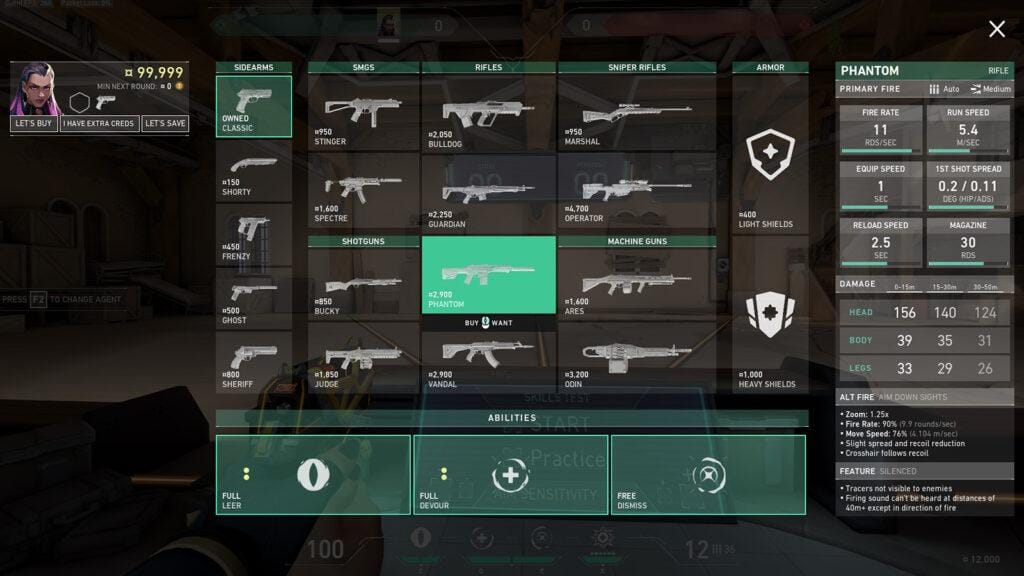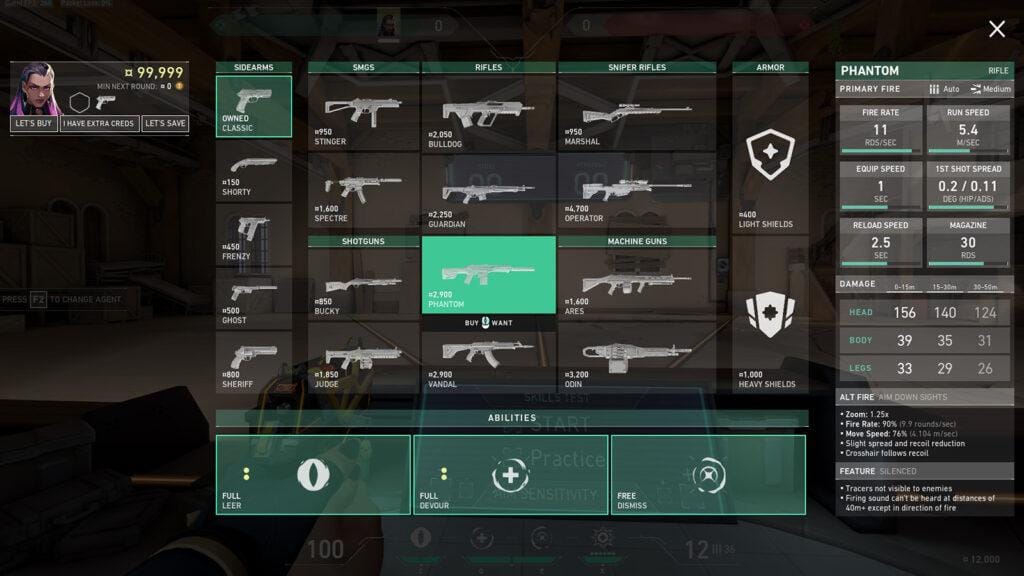


The economy in Valorant is a balance of resource management and strategic planning.
Every decision made about buying or saving credits influences your team's potential for success in subsequent rounds. Managing your economy isn't just about getting enough credits to purchase weapons; it's about making calculated decisions that optimize your team's strength throughout the game.
Managing your credits in Valorant is crucial, as it allows you to predict your opponent's moves, prepare for future rounds, and make informed choices about your team's arsenal.
In Valorant, the in-game currency is known as credits or creds. How many credits you own affects what weapons, shields, and abilities you can buy. Managing these credits effectively is crucial for building a strong arsenal and being prepared for every round.
The credit-earning process in Valorant is a multifaceted system that rewards players for various actions during a match. Here's a breakdown of how credits can be earned:
Victory: Winning a round is one of the primary ways to earn credits. Each player on the winning team receives a significant credit bonus.
Defeat: Losing a round still grants credits, but in a lesser amount compared to winning. This helps losing teams to potentially bounce back in subsequent rounds.
Spike Plant: For the attacking team, successfully planting the Spike provides a credit bonus, regardless of the round's final outcome.
Per Kill: Players earn credits for each kill they secure during a round. This incentivizes individual skill and aggressive play.
Saving: Choosing not to spend credits in a round (commonly known as an "eco round") allows players to save for future rounds, where they can buy more powerful weapons and equipment.
Comeback Mechanism: Valorant implements a comeback mechanism where teams on multiple losing rounds in a row receive an increasing amount of credits each round they lose. This helps to balance the game and gives losing teams a chance to recover.
The first round of each half: 800 credits
Each kill: 200 credits
Spike plant: 300 credits
Spike defuse: 300 credits
Round win: 3000 credits
Round loss: 1900 credits
Round loss reduced to 1000 credits (with no loss streak bonus) in the following scenarios:
Two consecutive round losses: 2400 credits
Three or more consecutive round losses: 2900 credits
Overtime: 5000 credits
Max credits for a single player: 9000 credits
Compensation for missing players
Creds reset after 12 rounds when switching sides
The pistol round, occurring at the start of each half, is pivotal in Valorant as it sets the economic foundation for subsequent rounds. Success in these rounds provides a significant advantage in terms of the immediate score and establishing an economic lead.
Teammates must balance between purchasing abilities and light shields while considering the limited budget. Skilled use of weapons like the Classic, Ghost, or Sheriff, coupled with strategic play, can make a substantial difference.
Winning the pistol round allows a team to potentially secure the following round due to the enemy's weakened economy, creating early momentum. Conversely, losing the pistol round often means facing an uphill battle regarding both score and economy. Therefore, teams must approach these rounds with a clear strategy, understanding the importance of teamwork, and effectively using their limited resources.
An Eco (Economical) or Save Round is when a team decides to spend very little or no credits, saving them for future rounds. This strategy is typically used after a series of losses or when the team's economy is weak.
A Half-Buy is a balanced approach where players spend some of their credits but not enough to deplete their reserves completely. It's a middle ground between a full buy and an eco round.
A Full Buy round occurs when players spend most or all of their credits to buy the best possible equipment, usually including best weapons, full armor, and abilities.
A Force Buy is when a team decides to spend all their remaining credits in a situation where they might typically save. This is usually done in an attempt to surprise the opponent or in a do-or-die scenario.
The first two rounds in Valorant are critical in establishing your team's economic foundation. Winning the first (pistol) round gives your team an upper hand, not just in terms of score but also in boosting your credits in Valorant.
The second round, following a win, is often where teams can capitalize on their economic advantage. It's important to balance the urge to immediately buy a rifle against the risk of being economically crippled if the round is lost. A balanced approach often involves upgrading to submachine guns, less expensive but effective against opponents likely on an eco round.
After winning the pistol round, the second round becomes a strategic decision point. If your team has won the first round, it's generally advisable not to immediately buy a rifle. This is because the enemy team will likely have weak armor and weaponry, making rifles an unnecessary expense that could jeopardize your ability to buy the next round if things go awry. Instead, investing in less expensive SMGs or shotguns can be smart, allowing your team to build a stronger economic position.
Constantly evaluating your team's economy is vital. During the buy phase, it's essential to check not just your credits but also those of your teammates. The goal is to ensure that most, if not all, team members can afford a full buy.
Having enough credits for a full buy typically means you have enough credits to buy a rifle, armor, and necessary abilities. If not everyone have enough for a full buy, the team might opt for a lighter buy or an eco round to synchronize the team's economy for future rounds.
An integral part of managing your team's economy involves strategies to hurt the enemy team's economy. This can be achieved by forcing them to spend more credits, either by consistently damaging their equipment in rounds or using strategies that make them use their abilities and resources.
Understanding the enemy team's economy since the start of the match can influence your team's decisions on whether to go for a more aggressive play or to conserve resources.
During a buy round, it's not always necessary to buy as much as possible. Sometimes, saving some credits for future rounds is more strategic, especially if your team is in a comfortable leading position or if you're planning for a significant purchase in the upcoming rounds.
Additionally, during the buy phase, it's a good practice to see how many credits each member has and plan accordingly, ensuring that the team is collectively strong for the next engagement. Consider the current score and the number of rounds remaining. If you're close to winning, it might be worth a force buy. Conversely, if there's still plenty of time, saving for future rounds could be more prudent.
Valorant's economy requires constant adaptation. A losing team might have to make tough decisions, like going for an eco round, even if they have enough to buy in the current round. This foresight can set them up for a stronger position in subsequent rounds, allowing for a potential comeback.
Duelists: As a Duelist, you're expected to be on the frontlines. Investing in rifles and full armor is often essential, as well as purchasing abilities that aid in taking engagements.
Controllers and Sentinels: These roles may focus more on utility over firepower. Spending on abilities that control the battlefield or provide information can be more beneficial than opting for the most expensive weapons.
Initiators: Balancing between utility and firepower is key. When playing as an Initiator, you should ensure they have enough credits for abilities that can initiate fights or disrupt enemy positions.
Adapt to the Opponent's Economy: Keep track of the enemy's economy. If they are likely on an eco round, you might opt for less expensive weapons to counter their likely aggressive play.
Coordinate Buys with Your Team: Communication is crucial. Ensure that your team's buying decisions are coordinated to avoid situations where some players have superior gear while others are left with minimal resources.
Prioritize Important Purchases: Sometimes, it's better to have fewer abilities but maintain a strong weapon and armor. Prioritizing essential purchases based on your role and the team's strategy is vital.
Learn to Use All Weapons: Being versatile with different weapons can save credits. Knowing how to effectively use eco-friendly weapons like the Spectre or Sheriff can be game-changing.
Economic Buffer: Aim to maintain a credit buffer for future rounds, especially in uncertain matches. This ensures that you won't be caught off-guard without essential gear in critical rounds.
Practice Makes Perfect: Finally, the best way to perfect your economic strategy is through practice and experience. The more you play, the better you'll understand when to save, when to spend, and how to make the most of your resources.
Even the best players can fall prey to common economic mistakes in Valorant. These include overspending in early rounds, misjudging the opponent's economic status, and forgetting that Valorant is a team game. By recognizing these pitfalls and learning to avoid them, players can significantly improve their performance and decision-making in matches.
Knowing how the economy works in Valorant is the beginning of your continuous learning. This guide has walked you through the various aspects of the game's economy system, providing insights and strategies to enhance your play or coaching. Remember, the economy in Valorant is a game within a game, one that requires patience, foresight, and tactical acumen. Apply these lessons, experiment with your strategies, and watch as your understanding of Valorant's economy transforms your approach to the game.

Charlene is an esports journalist and content writer covering competitive League of Legends, Valorant, and more.
View all articles